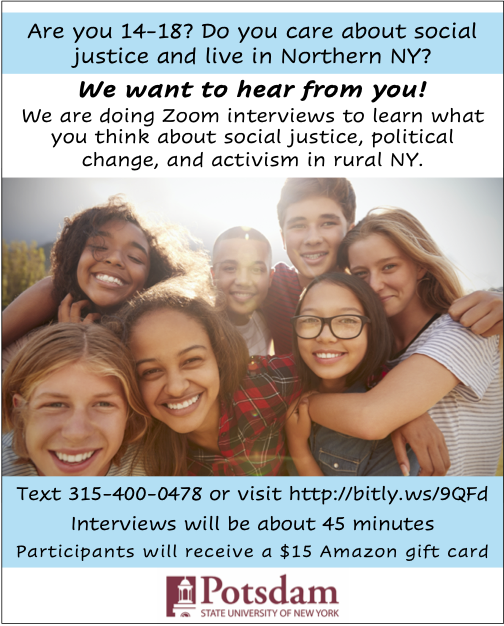Research Projects

Rural Youth Activism (in progress)
I am currently working my colleague, Dr. Leandra Smollin, on qualitative interview research designed to understand the perspectives and experiences of 14-18 year old rural youth who are interested in social justice, activism, or social and political change. We want to understand what social and political issues are important to young people, where they get information about those issues, what they “do” in terms of engaging around those issues, what it means to be an activist, and their perceptions of the influence of living in a rural community on their social and political socialization and activist efforts. By asking these questions of youth, we hope to fill gaps in scholarly knowledge about social movements, youth activism, and social movements and youth activism in rural contexts specifically. In addition, we hope to contribute to understandings of how living in a rural area and engaging in social activism impacts the development of qualities central to positive youth development. Finally, this project aims to contribute to practical efforts to support youth in community change and civic engagement efforts.
More info.
Dissertation Research: "As Goes California, So Goes the Nation(?)" The Marriage Equality Movement: A Study of Reactive Mobilization" (2015)
My experiences as an activist in the California marriage equality movement influenced my interest in exploring the dynamics of the period of mass mobilization that occurred after Proposition 8 passed in November of 2008. My research answered the question, "how did California's marriage equality activists change how they organized their movement infrastructures, their framing of messages about marriage equality, and their strategies and tactics in response to No on Prop. 8's failure to stop the passage of Proposition 8?" The data, drawn from 47 qualitative interviews with movement activists and leaders, participant observations, and an archive of movement documents and media, suggests that activists' emotional responses influenced them to emphasize building organizations that utilized new tactics. Activists also organized within communities of color, rural communities and communities with little existing organizational infrastructure and they constructed new messages about marriage equality, framing marriage as a right to love that emphasized the shared cultural understanding of marriage as an universal legal and cultural rite. Further, activists deployed new and adapted tactics that required the conscious deployment of identity to communicate this message to the public.
My dissertation research was supported by the Beth B. Hess Memorial Scholarship (Sociologists for the Study of Women in Society), The Flacks Fund for the Study of Democratic Possibilities (UCSB), a Humanities and Social Sciences Research Grant (UC Santa Barbara), and a Sociology Department Research Grant (UCSB).
In the news:
- http://www.sfweekly.com/sanfrancisco/a-more-perfect-union-prop-8-may-lead-to-gay-marriage-rights/Content?oid=2186741
- http://www.news.ucsb.edu/2013/013569/ucsb-sociology-and-political-science-scholars-analyze-supreme-court-rulings-same-sex
